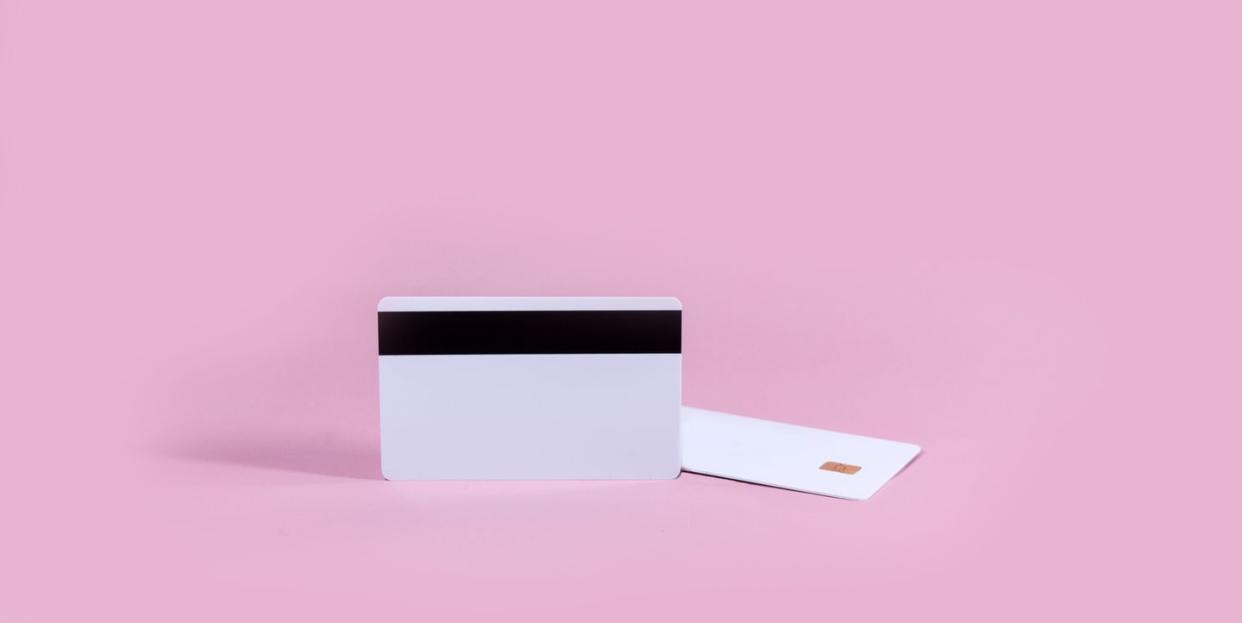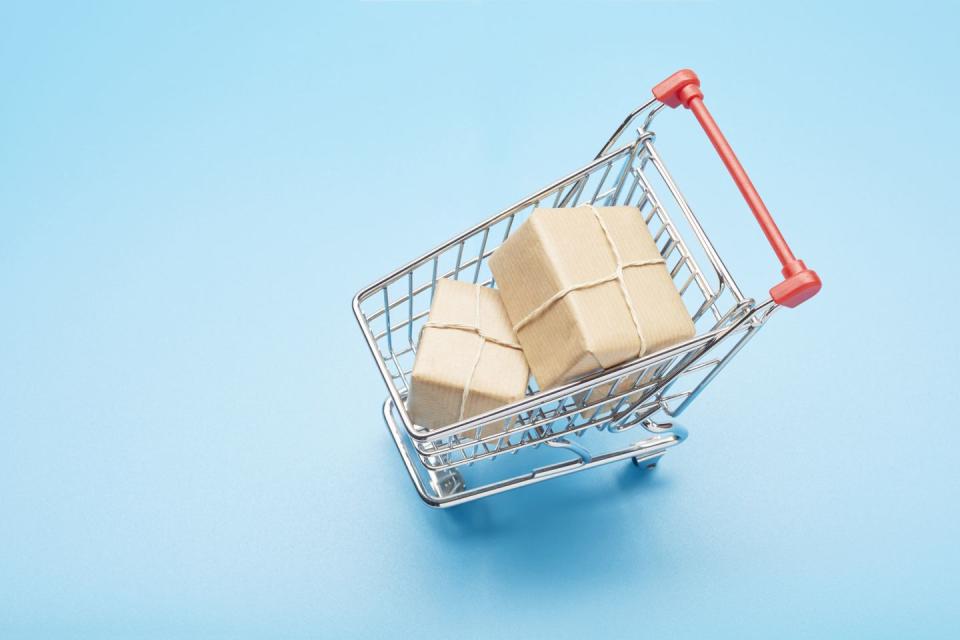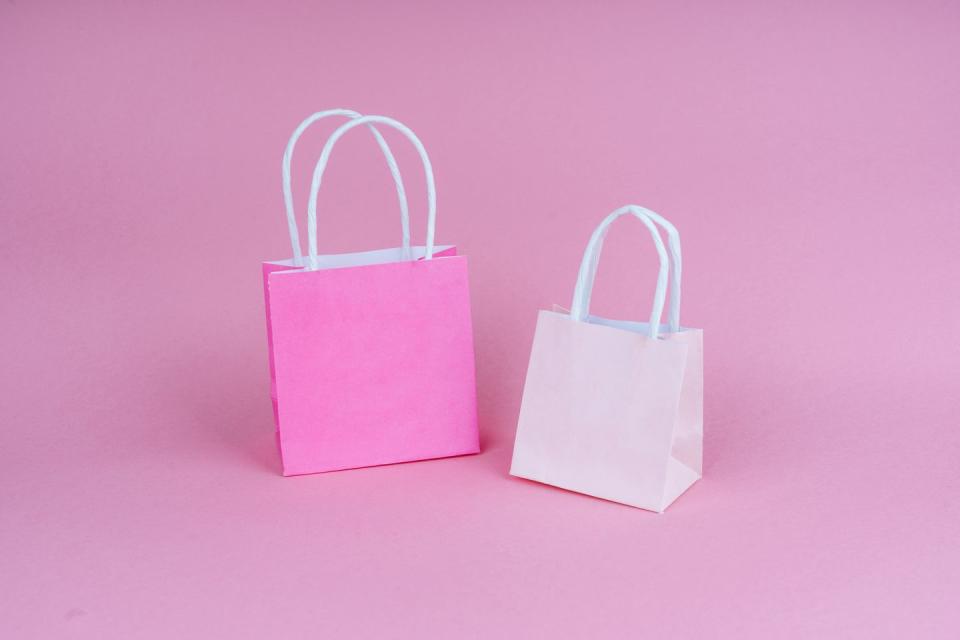How Klarna's buy now, pay later scheme could damage your credit score

Online shopping can be addictive, literally, not to mention time consuming. By the time you've ordered, had your purchase delivered, and discovered it doesn't suit you/you don't like it - then you have to wait for your refund.
It's probably for this exact reason (and the fact it feels like you're getting new clothes for free) that buy now, pay later schemes like Klarna have seen such a rise in popularity in recent years. "Split the cost into monthly instalments or pay in full up to 30 days later," Klarna's website reads, explaining the proposition. And it's an appealing one; since being introduced to retailers including ASOS, Topshop, H&M and Boohoo, customers have been able to purchase clothes without having to pay the full balance immediately. Its popularity is undeniable; in Klarna's most recent statistics, the Swedish fintech company revealed it was attracting 25,000 new UK users each week.
But now, concerns are being raised that such schemes could potentially be damaging to your credit score. And with so many young people being enticed into using the pay later option, are they aware of the toll it could take on their finances - and the longer term consequences?
"When I was getting married a few years ago I wanted some nice clothes for my honeymoon, but had spent loads of my money on the wedding itself," 33-year-old Laura* tells Cosmopolitan. "So when an online shopping site said I could spread the cost of my holiday wardrobe it seemed a good solution."
As one business testimonial on Klarna's website points out, the Klarna checkout is "ridiculously" easy. "It really is child’s play," says Ian Hoverd, Head of Ecommerce at Swedish childrenswear brand Polarn O. Pyret. "Particularly when buying from mobile, which many of our return purchasers are. All the details are pre-filled and the products can be bought instantly with one-click."
"As soon as they have used it once, repeat purchases are just one click away," adds Sean McKee, Director of Ecommerce and Customer experience at Schuh.

Laura took advantage of the ease with which she could sign up, wore her nice clothes, and found herself hooked on the 'pay later' cycle. But there was a problem; while the newlywed had been sure all the resulting payments were going out automatically - having believed she'd checked a box agreeing so - it turned out this wasn't the case.
"I received a letter telling me to pay my bill, and I was confused because I had done," Laura recalls. Several more letters arrived, which led her to call up the company explaining that she had paid, but over the phone Klarna told Laura they had no evidence of her subsequent payments - and neither did she.
"Eventually I just paid off the entire balance and closed the account - but a few years later we applied for a mortgage extension so we could do up our loft and it was rejected because I had a bad credit rating." The cause? "My Klarna account!" Laura says.
Laura was shocked at the detrimental effect the buy now, pay later scheme had had on her finances. "I felt really stupid that wanting nice clothes for my honeymoon was now impacting a huge thing in my life," she tells Cosmopolitan.
A tweet shared on social media, describing Klarna as "dangerous" - particularly because "it's directed at students" - has prompted numerous others to share similar negative experiences.
"They don’t send reminders, only one email that gets buried underneath all your other spam mail and no text reminders! Even though they have your number," warned one person. "As I saw this I remembered that I needed to pay my last order. Totally forgot about it and it’s two days past the deadline," commented another.
And there lies the problem. A lack of reminder to pay can mean missed payments, and missed payments can mean a jeopardised credit score. "Buy now pay later credit, whether online or in store, will usually be registered on your credit report held by one or more credit reference agencies," explains James Jones from consumer credit reporting company Experian.
"If managed correctly, these agreements can help build up your credit history and boost your credit score. However, failing to meet any of the repayment deadlines could put an unwelcome dent in your credit score, so is something you really want to avoid," he warns.

"Your credit score is important as it helps lenders decide whether they want you as a customer. Credit scores estimate how likely it is that you will repay credit on time in the future," Jones explains. "The higher your score, the lower the chances of you missing payments, and the more likely you are to be accepted for a wide range of accounts."
Included in this wide range are "financial products like loans and credit cards, and other common household bills such as monthly phone and energy contracts," notes the expert. So basically, if you don't want to get turned down for that new phone contract - or that mortgage in years to come - you don't want to risk having a damaged credit score.
"To help protect your credit rating, make sure you fully understand what you are signing up to and never take on more than you can comfortably afford to repay. If you can, set up Direct Debits and diarise any important payment dates," the expert advises.
So how exactly does Klarna work? The pay-later scheme has two different options, and each product differs in payment process. "Some [payments] are automatic, others are manual," Klarna explains. And it seems that it may be the second option - the 'pay in 30 days' product - that has led to Laura and so many others' inadvertent missed payments.
The first option is to pay in monthly instalments. "At the retailer's checkout, select the Klarna option and enter your debit or credit card information. No interest or fees - ever. It’s as simple as making any other card purchase," Klarna's website explains.
"After the retailer confirms that the order is on its way, we will charge your card for the first third of the total amount. We’ll send you a notification once the payment has been processed," the instructions continue. After that, the process simply wraps up. "Every 30 days we will automatically charge your card 1/3 until the full order amount has been paid. You will be informed ahead of time," the site adds, reiterating: "There's no interest, or fees to pay."
Pay with one click. That’s smoooth.
A post shared by Klarna | Smoooth shopping (@klarna) on Jul 19, 2018 at 9:40am PDT
But if you choose the 'pay in 30 days' option - the most popular Klarna service - it works slightly differently. And it seems this may be where people are tripping up.
At the retailer’s checkout, when you select to pay up to 30 days later, you only "enter simple, top-of-mind information. No need for card numbers or complex information to complete the order," the site explains. The "complex information" they refer to is what prevents an automatic payment being made; without card numbers, Klarna cannot retrieve the purchase balance from your account - which means it's up to you to remember.
When the order is shipped, your agreed payment period starts. From then, you have up to 30 days to make the payment, which you'll have to do manually. "You can easily make your payment online or in our app. Once you’ve connected your bank account, debit or credit card, the checkout process is as simple as a single tap."
According to Laura - and some of the tweets in the viral thread - payment reminders are scant. Often, it's claimed, just one email is sent - and this is at risk of being lost in junk mail folders - so it's easy to see how customers can get behind on payments and risk damaging their credit score.
"Once a customer has used Klarna they are sent email communications and in app reminders to pay, complete with all T&Cs," Klarna's UK General Manager, Luke Griffiths, tells Cosmopolitan. But he doesn't specify exactly how frequently these emails are distributed.
"For the minority of customers that do not pay within the 14-30 day window, we regularly communicate with them to remind them of their responsibilities. After their repayment window has closed, we try to reach out to them over a period of several months to re-establish communication and ask for repayments," the fintech company's statement continues.
But again, despite noting that they communicate "regularly" with customers who are approaching the end of their repayment window, it isn't specified how many reminders are sent.
Griffiths does confirm, however, that Klarna recently introduced a Direct Debit option in the app, which could theoretically allow customers to schedule payments in advance, at the point of purchase, to avoid any late or missed payments. As well as that, it seems more frequent payment reminders are delivered by push notifications if you download the app. But all that assumes you have the Klarna app, which many users might not think to do.
Laura admits she should have been more careful, but feels that Klarna must take responsibility for the failings of their system, too. "I should have paid more attention, read the small print and kept a better eye on it, but I wasn't aware that this was something happening to everyone else until people began to talk about it," she says. "Now I think they need to be A LOT clearer on the true impact and whether the money is coming out of your account."

"We are transparent about how we offer our products and services, and all relevant T&Cs are displayed clearly on our website and at the checkout on our retailers’ websites," the Klarna UK General Manager insists in his statement to Cosmopolitan.
"At Klarna we use simple language that is jargon free to ensure all of our customers understand what they are signing up for, alongside traditional FAQ’s we also have a mythbusters section on our website for to clear up any questions. If a customer has any concerns, we want to make it as easy and convenient as possible for them to contact us, so we operate on a wide range of channels — 24/7 chat in app, email or phone."
It's easy to see why retailers like Klarna. The ease of the pay-later scheme entices customers to splurge more readily and yields a spike in sales. "Klarna assured us that any increase in returns would be offset against increases in purchase frequency and basket values – and they were right," Paul Masters, Chief Operating Officer of In The Style, confirms on the Klarna website.
And it undoubtedly has its uses for customers, too, who can facilitate a pre-pay day purchase they might not otherwise have been able to afford. But when Klarna has the power to influence your credit rating, and therefore your long term financial capabilities, it's something that must to be undertaken with responsibility and awareness. Because if you slip up, you'll only end up regretting it later.
*Name has been changed.
You can review your credit score for free on the Experian website.
Follow Cat on Twitter.
Like this article? Sign up to our newsletter to get more articles like this delivered straight to your inbox.
You Might Also Like

